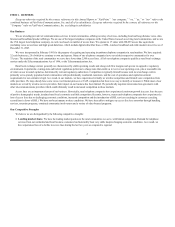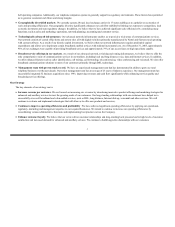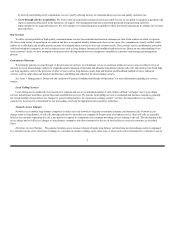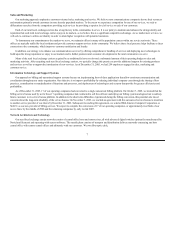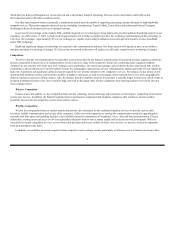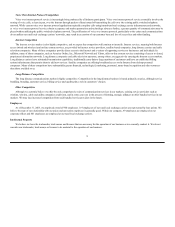FairPoint Communications 2005 Annual Report Download - page 14
Download and view the complete annual report
Please find page 14 of the 2005 FairPoint Communications annual report below. You can navigate through the pages in the report by either clicking on the pages listed below, or by using the keyword search tool below to find specific information within the annual report.
carrier payments for interconnected traffic. Furthermore, in the notice of proposed rulemaking on voice over internet protocol services adopted by the Federal
Communications Commission in February 2004, the Federal Communications Commission has sought comment on whether access charges should apply to
voice over internet protocol or other internet protocol based services. It is unknown at this time what additional changes, if any, the Federal Communications
Commission may eventually adopt and the effect of any such changes on our business.
Our rural local exchange carrier services segment revenue is subject to regulation including
regulation by the Federal Communications Commission and incentive regulation by various state regulatory commissions. State lawmakers will likely
continue to review the statutes governing the level and type of regulation for communications services. It is expected that over the next few years, legislative and
regulatory actions will provide opportunities to restructure rates, introduce more flexible incentive regulation programs and possibly reduce the overall level of
regulation. We expect the election of incentive regulation plans and the expected reduction in the overall level of regulation to allow us to introduce new services
and pricing changes more expeditiously than in the past. At the same time, however, the implementation of such new programs may also lead to reductions in
intrastate access charges.
The Federal Communications Commission generally must approve in advance most transfers of control and assignments of operating authorizations by
Federal Communications Commission-regulated entities. Therefore, if we seek to acquire companies that hold Federal Communications Commission
authorizations, in most instances we will be required to seek approval from the Federal Communications Commission prior to completing those acquisitions.
The Federal Communications Commission has the authority to condition, modify, cancel, terminate or revoke operating authority for failure to comply with
applicable federal laws or rules, regulations and policies of the Federal Communications Commission. Fines or other penalties also may be imposed for such
violations. Our interstate common carrier services are also subject to nondiscrimination requirements and requirements that rates be just and reasonable.
The Federal Communications Commission has required that incumbent independent local exchange carriers that provide interstate long distance services
originating from their local exchange service territories must do so in accordance with “structural separation” rules. These rules require that our long distance
affiliates (i) maintain separate books of account, (ii) not own transmission or switching facilities jointly with the local exchange affiliate, and (iii) acquire any
services from its affiliated local exchange telephone company at tariffed rates, terms and conditions. The Federal Communications Commission has initiated a
rulemaking proceeding to examine whether there is a continuing need for such requirements; however, we cannot predict the outcome of that proceeding.
State Regulation
Most states have some form of certification requirement that requires providers of communications services to obtain authority from the state regulatory
commission prior to offering common carrier services. Each of our 28 rural local exchange carriers operates as the incumbent local telephone company in the
states in which it operates and is certified in those states to provide local telephone services. State regulatory commissions generally regulate the rates incumbent
local exchange carriers charge for intrastate services, including rates for intrastate access services paid by providers of intrastate long distance services.
Although the Federal Communications Commission has preempted certain state regulations pursuant to the Telecommunications Act, states have retained
authority to impose requirements on carriers necessary to preserve universal service, protect public safety and welfare, ensure quality of service and protect
consumers. For instance, incumbent local exchange carriers must file tariffs setting forth the terms, conditions and prices for their intrastate services, and
such tariffs may be challenged by third parties. From time to time, states conduct rate cases or “earnings” reviews. These reviews may result in the
disallowance of certain investments or expenses for ratemaking purposes.
12


